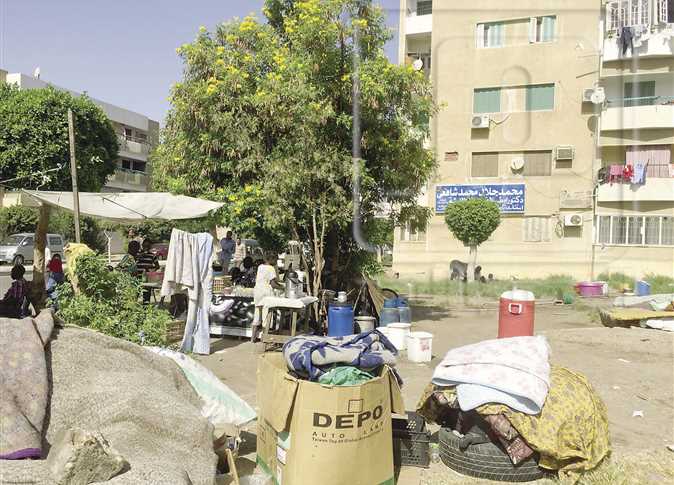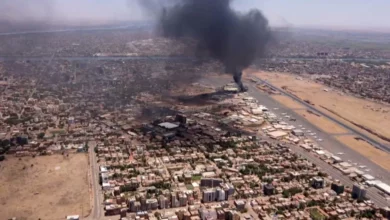
Five days after the sinking of a boat off Rashid, as the bodies of migrants were pulled out of the boat's refrigerator, two Sudanese brothers, Nabil and Omar, were standing on the beach among the relatives of the dead. They were hoping they might recognize the body of their brother Abdoun among those brought to the surface, allowing him to be buried.
Nabil works in an Arab country, while Omar works in Europe. They both returned to Egypt immediately on hearing of the sinking of the boat with more than 450 Egyptians and Africans on board.
A week before the accident, they were in contact with Abdoun, and he told them he was planning emigrate to Europe illegally on a boat, sailing toward his dream of completing his education to Europe.
The two brothers are dealing with the incident as a fait accompli. But the decision to risk one's life in a smuggler's boat on the Mediterranean has its roots in an unbearable situation in Egypt, and evidence of that can be seen on the pavement outside the Cairo of the UNHCR in 6th October City.
Camping in Cairo
Every day at dawn, the street in front of the UNHCR office is packed with Africans immigrants seeking asylum — Sudanese, Eritreans, Ethiopians and Somalis.
In the past few years some of them spent the night at the commission gates in the hope of finishing the registration procedures. Others are submitting requests for housing or education, resettlement or employment opportunities. The number of requests increases daily, with new immigrants arriving all the time.
The garden of the commision is littered with blankets, mattresses, dishes, water bottles, kerosene stoves for cooking, clothes and basic tools. Behind this are residential buildings, the residents of which have erected barbed wire to prevent the immigrants from entering their neighborhood.
Residents say the assylum seekers only cause trouble in the area. One resident, whose balcony overlooks the garden, said they behave badly on the street, while collecting plenty of money from the commission.
One Sudanese refugee girl bears burn marks on her face from an incident in Cairo in which she was allegedly sexually assaulted by a man in the area. Her mother starts to tell the details of the incident, showing the police records and medical reports. But the girl yells at her mother, telling her to stop.
In the past, migrants held protests here every Sunday, their demonstrations interspersed with fights due to overcrowding at the gates, as well as scuffles with local residents. In early September, some even attempted to kill themselves by self-immolation.
Fleeing conflict
According to the UNHCR in Egypt, many of the asylum seekers are Syrians fleeing the armed conflict in their country.
There are also Sudanese people fleeing fighting between the Sudan People's Liberation Movement-North and the Sudanese armed forces in the states of Blue Nile and South Kordofan and the region of Sudan Abyei. Others are fleeing violence in Darfur or elsewhere in South Sudan.
Many of the Sudanese have been resident in Egypt decades and they say the situation in Sudan is so unstable that they fear the consequences of returning home.
Adding to these are Somalis fleeing due to security tensions in the country, and Eritreans seeking refuge from human rights violations or forced recruitment. There are also Iraqi refugees who fled the escalating violence in their country.
Africans experience the worst living conditions in Egypt. Mubarak Essam Hassan, 35, from eastern Sudan, was a soldier in the Signal Corps of the Sudanese armed forces. He came to the UNHCR office in Egypt, asking permission to emigrate to Europe to join his mother, who emigrated to Italy illegally nine months ago to escape the war in Sudan.
Mubarak thought that his stay in Egypt would not exceed two months, during which time he would register with the UNHCR and request resettlement. However, he has been here for nine months, living in the street in front of the commission. He has no money and no work, and he faces daily harrassment on the streets.
The right to asylum is stipulated in Article 91 of the Egyptian Constitution: "The State may grant political asylum to any foreigner persecuted for defending the interests of people, human rights, peace or justice. Extradition of political refugees is prohibited. All of the foregoing shall be according to the Law."
Mubarak recalls his trip to Egypt, saying: "Nine months ago, I came to Cairo to escape the war in eastern Sudan, and I lived with my friend in Behooth area (in Giza), paying a rent of LE500 pounds per month. I stayed with my colleague for two months, and after that I could not stay because his wife and the rest of his family came to Egypt. So I moved to the Downtown area, but the rent is too high. I sat in Ibrahim Pasha Street in Downtown Cairo and was robbed and harassed by passers-by. So I moved to the commission and decided to stay on the side of the road in front of it."
Collecting bottles
Although he has trouble walking due to his illness, he works at collecting plastic water bottles and soda cans, selling them to garbage traders for LE5 pounds per kilo. In this way, he and other refugees manage to scrape a living.
Mubarak sleeps, bathes, and cooks his food in the garden in front of the commission, waiting for the response to his resettlement request. He suffers from asthma and diabetes, and he has kidney problems, and the commission gives him a small amount of money to pay for medicines.
"All what I want is to travel to Italy for my mother. My mother traveled across the sea by boat to Italy, but I cannot travel there because it costs more than US$3,000. At that time, we were only able to provide money for her travel. But I can't travel even across the sea, because I don't have the money.
"Also, over the past nine months, my health has deteriorated dramatically and I can't get treatment because of a lack of financial resources," Mubarak added.
For months, Mubarak asked the commission to take care of his asylum request so he can join his mother, but so far he has not been successful.
"Every day, I go they tell me to come tomorrow! And I come to them after a month but nobody answers me, nobody has given me treatment of money. All I get from the commission using the yellow card is food from a church association, which is oil, beans and lentils. They told me to come each month to get the bag, and so I have been getting food from them every month. I make this trip from Zamalek to 6th of October every month," Mubarak said.
During their protests, the migrants are subjected to insults and sometimes splashed with hot water. But Mubarak says, "The country has police to keep us apart. Sometimes we are exposed to harassment on a daily basis by residents, and each time we only got to the police, who are always talking with them and trying to keep us apart. We end up filing a report with the police, and then we reconcile."
Migrants living outside the commission's office fear the cold weather of the winter, and Mubarak has asked the commission to at least provide tents and clothes.
"I cook food in the street, and the money is not enough," says Mubarak, "The situation has became intolerable."
Suicidal thoughts
Haleema al-Waly is another Sudanese asylum seeker frustrated by the slow pace of processing applications and the small amount of support offered by the commission.
"We have lost hope and think of suicide every day," says Haleema.
Some of them have actually committed suicide, among them an Ethiopian refugee who set herself and her children ablaze. The refugees tried to save her but she died. The Commission then took over the resettlement process for her two children outside Egypt, according Haleema.
Fadia Abou Ghazi came to Cairo with her son and daughter in 2013, seeking to escape the war in Sudan. The commission gave her the standard yellow card that identifies her as a resident asylum seeker, meaning she can't be forcibly deported.
Fadia says she only wants a "safe and decent life for her two kids." She lived in the Nasr City area, working with her children to pay the monthly rent one her apartment, and secure the requirements of everyday life. However, she lost her job and had to resort to the commission for adequate housing and a monthly income.
Hameda lives with her son and daughter in the garden of the UNHCR office. Her son collects waste paper and sells it to garbage traders to support the family. Like the other refugees, he pays a daily fee to local coffee shops to use their bathrooms for relieving himself, washing his clothes and showering.
Hameda says that the commission provides them with assistance, but he says the processing of applications is slow. Also, the financial assistance they get is very little and there is no help with housing. On the other hand, he says, the UNHCR provides LE1,050 per child for education each year.
Unable to return
Om Fathiya, a refugee from eastern Sudan, came to Egypt a year ago with her husband and daughter. She was pregnant when she arrived, and after being here for a month, her husband died. She tried to return to Sudan, but was unable to find the money for the journey. In addition, she lost her house in Sudan because of the war, and she resorted to the commission and got her yellow card. She also started receiving food aid from Caritas, an NGO that works with the commission.
"The commission helped me to get the residence permit and apply for my daughter to go to school, in which she is treated as an Egyptian student under the four-rights agreement. I began to get food aid from Caritas, and I rented an apartment in Osman Housing in 6th October City.
"However, the food aid was only for five months and it did not continue," Om Fathiya said.
"The Commission became my home since I lost my home. And I know they will help us, but they need to move things along faster. It is the only place and our refuge," she adds.
Ahmed Abd al-Aleem, chairman of Tademon — Egyptian Refugee Multicultural Council, confirms that the processing of asylum seekers is going slowly, and he says this impacts negatively on those awaiting a decision in Cairo, particularly the Africans.
He said the financial situation of the African migrants is getting worse because of a lack of financial resources, as well as a lack of cooperation between the commission and civil society organizations.




